Unit 1Past and Present Grammar课件 (共29张PPT,含内嵌视频)牛津译林版八年级下册
文档属性
| 名称 | Unit 1Past and Present Grammar课件 (共29张PPT,含内嵌视频)牛津译林版八年级下册 |  | |
| 格式 | pptx | ||
| 文件大小 | 3.9MB | ||
| 资源类型 | 教案 | ||
| 版本资源 | 牛津译林版 | ||
| 科目 | 英语 | ||
| 更新时间 | 2025-02-06 13:50:53 | ||
图片预览

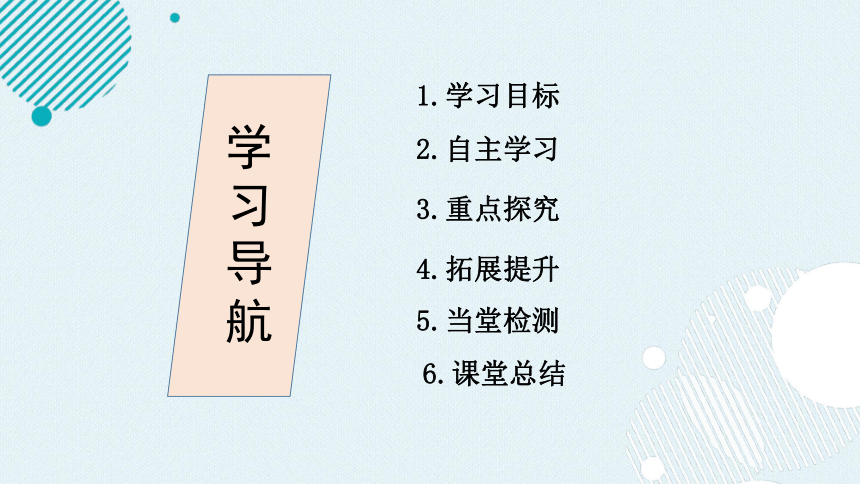
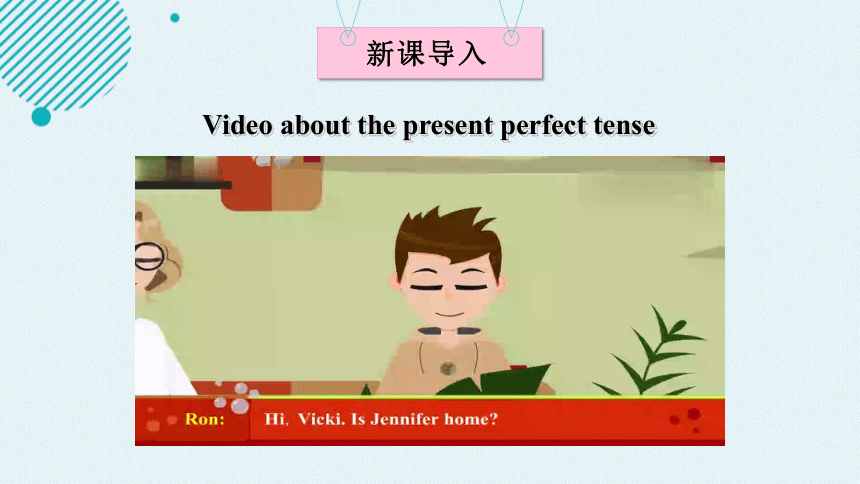

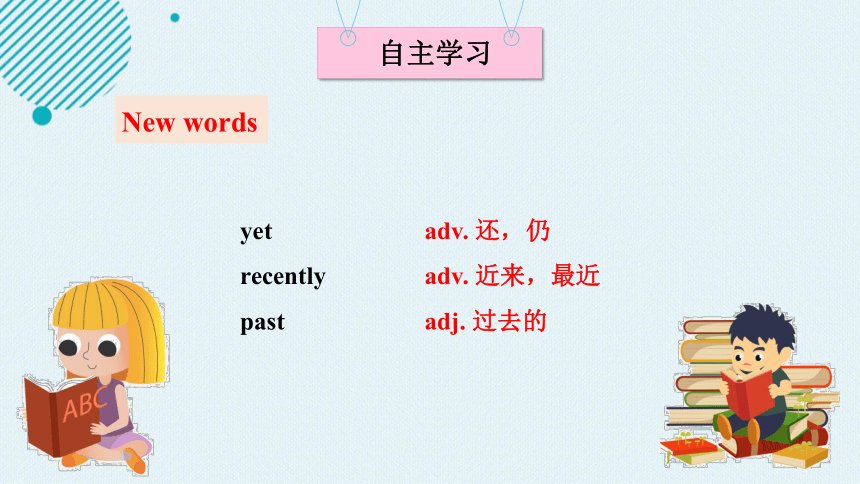
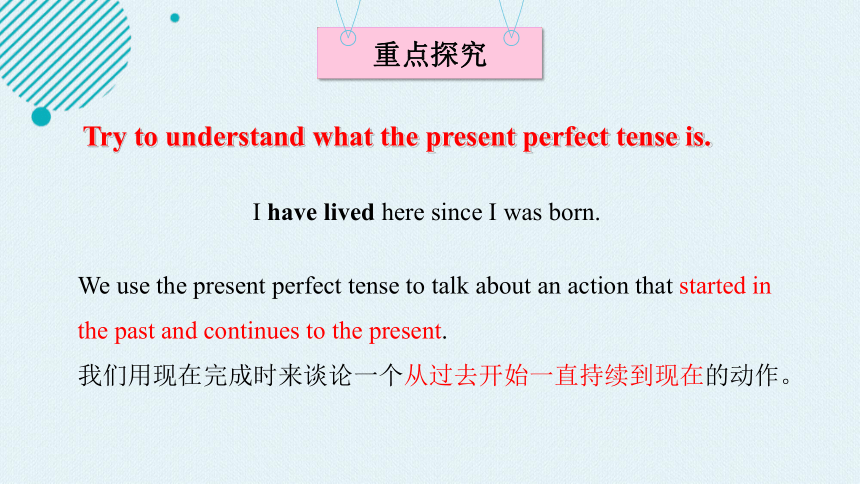
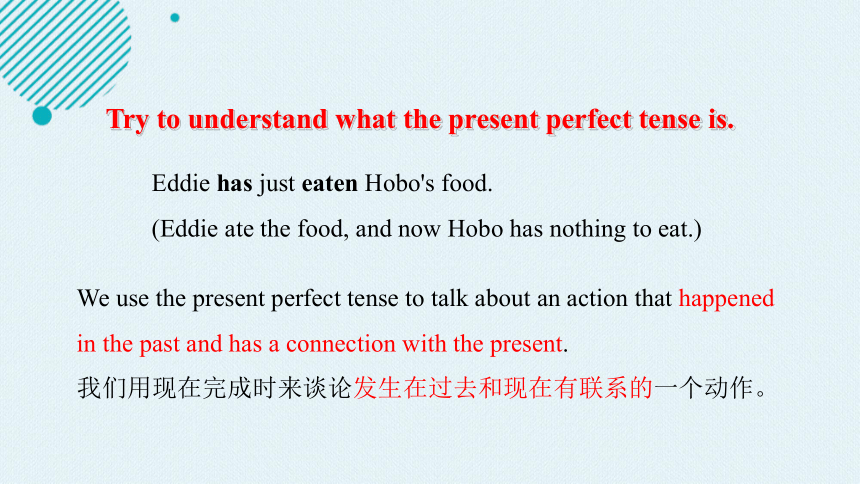

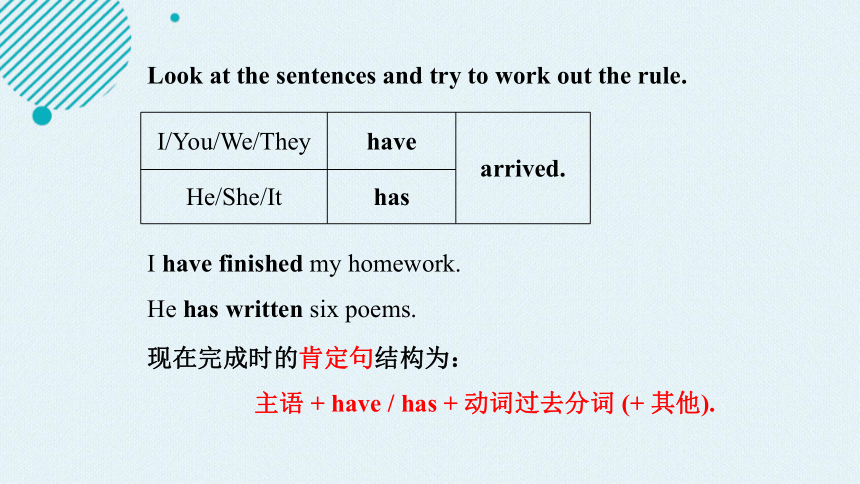
文档简介
(共29张PPT)
Unit 1
Past and present
Period 3
Grammar
1.学习目标
3.重点探究
2.自主学习
学习导航
5.当堂检测
6.课堂总结
4.拓展提升
新课导入
Video about the present perfect tense
1.能熟悉并正确运用本课时的重点单词和短语。
2.能掌握现在完成时的基本结构和用法
3.能掌握动词过去分词的变化规则。
学习目标
New words
自主学习
yet
recently
past
adv. 还,仍
adv. 近来,最近
adj. 过去的
重点探究
I have lived here since I was born.
We use the present perfect tense to talk about an action that started in the past and continues to the present.
我们用现在完成时来谈论一个从过去开始一直持续到现在的动作。
Try to understand what the present perfect tense is.
Eddie has just eaten Hobo's food.
(Eddie ate the food, and now Hobo has nothing to eat.)
We use the present perfect tense to talk about an action that happened in the past and has a connection with the present.
我们用现在完成时来谈论发生在过去和现在有联系的一个动作。
Try to understand what the present perfect tense is.
I have already read this book many times.
We also use the present perfect tense to talk about how many times an action has happened till now.
我们也用现在完成时态来谈论一个动作到现在已经发生了多少次。
Try to understand what the present perfect tense is.
Look at the sentences and try to work out the rule.
现在完成时的肯定句结构为:
主语 + have / has + 动词过去分词 (+ 其他).
I/You/We/They have arrived.
He/She/It has I have finished my homework.
He has written six poems.
Look at the sentences and try to work out the rule.
I/You/We/They have not arrived.
He/She/It has I haven't seen the movie yet.
He hasn't come here yet.
现在完成时的否定句结构为:
主语 + have / has + not + 动词过去分词 (+ 其他).
have not = haven't has not = hasn't
Have I/you/we/they arrived
Has he/she/it Yes, I/you/we/they have.
he/she/it has.
No, I/you/we/they haven't.
he/she/it has not/hasn't.
Look at the sentences and try to work out the rule.
现在完成时的一般疑问句及其肯否定回答结构为:
Have / Has + 主语 + 动词过去分词 (+ 其他)
Yes, 主语 + have / has. No, 主语 + haven't / hasn't.
Look at the words and try to work out the rules the formation of the past participles of regular verbs.
work→worked listen→listened jump→jumped finish→finished
大多数的动词的过去分词只需在动词后加-ed。
close→closed like→liked agree→agreed change→changed
以e结尾的动词的过去分词只需在动词后加-d。
Look at the words and try to work out the rules the formation of the past participles of regular verbs.
study→studied carry→carried
try→tried worry→worried
以辅音字母加y结尾的动词的过去分词应将y改为i再加ed。
stop→stopped drop→dropped
以重读闭音节结尾的动词的过去分词要双写末尾的辅音字母再加-ed。
No change come→come hurt→hurt
Change the vowel hold→held win→won
Change the consonant lend→lent build→built
Change the vowel(s) and the consonant(s) catch→caught keep→kept
forget→forgotten tell→told
Others be→been have→had
fall→fallen fly→flown
draw→drawn see→seen
其他一些不规则动词的过去分词的变化规律。
Regular verbs Irregular verbs Base form Past participle Base form Past participle
visit visited hit hit
repair repaired put put
live lived meet met
move moved make made
try tried sell sold
study studied give given
fit fitted write written
plan planned think thought
下表展示了动词过去分词的更多例子。
A. Mr Wu wants the students to practise using the present perfect tense. Help them write the past participles of the verbs below.
1 borrow _______
2 hope ______
3 make ______
4 get ______
9 say ______
10 grow ______
11 hit ______
12 enjoy ______
5 plan _______
6 cry _______
7 send _______
8 watch _______
borrowed
hoped
made
got
planned
cried
sent
watched
said
grown
hit
enjoyed
B. Mr Wu asks the students to complete the sentences below using the present perfect tense. Help them complete the sentences.
1. They _____________ (finish) their homework already.
2. John ________ never _________ (visit) China.
3. Mr Li ____________ (repair) over ten bicycles since Monday.
4. We ____________ (not see) each other for years.
5. My parents _____________ (not come) back yet.
6. Our teacher __________ (teach) us a lot about the history of China.
have finished
has visited
has repaired
haven't seen
haven't come
has taught
C. Millie and Sandy are talking about a film about the history of plete their conversation with the correct forms of the verbs in brackets.
Millie: ______ you _____ (see) any films recently, Sandy
Sandy: No, I haven't. What about you
Millie: I _____ (see) one last Saturday.
Sandy: What's it about
Millie: It's about the changes in Beijing over the past century. From this
film, I __________ (learn) more about Beijing's past and present.
Sandy: Oh, I think I __________ (hear) about the film. Do you plan to
see it again
Millie: Yes, I'd like to.
Have seen
saw
have learnt
have heard
拓展提升
Language Points
现在完成时(Ⅰ)
我们用现在完成时表示从过去持续到现在的动作或状态,或已完成但对现在有一定影响的动作。如:
He has lived here since he came to Nanjing.
自从来到南京,他就住在这里。
I have lost my mobile phone.
我的手机丢了。
现在完成时常和already、ever、just、never、recently、yet等副词以及since、for引导的时间状语连用。如:
He has already taken first prize twice. 他已经拿过两次一等奖了。
He has not returned the book to me yet. 他还没有把那本书还给我。
He has never visited the Great Wall. 他从没去过长城。
注意:already常用于肯定句,意思是“已经”,而yet常用于否定句和疑问句,意思是“还”。
现在完成时的动词构成:have/has + 动词的过去分词
现在完成时的结构:
1. 肯定句:主语 + have / has + 动词过去分词 (+ 其他).
e.g. Someone has cleaned the window. 有人已经擦了窗户。
We have lived here for two years. 我们在这里住了两年了。
2. 否定句:主语 + have / has + not + 动词过去分词 (+ 其他).
e.g. I haven't finished the work yet. 我还没有完成这项工作。
He hasn't cleaned his room. 他还没有打扫他的房间。
现在完成时的结构:
3. 一般疑问句及其肯定否定回答:
Have / Has + 主语 + 动词过去分词 (+ 其他)
Yes, 主语 + have / has. No, 主语 + haven't / hasn't.
e.g. —Have you finished you homework 你做完作业了吗?
—Yes, I have. 是的,我做完了。
—No, I haven't. 不,我没有做完。
—Has he ever been to Beijing 他曾经去过北京吗?
—Yes, he has. 是的,他过去。
—No, he hasn't. 不,他没有去过。
大多数动词的过去分词变化形式同动词的过去式,可参考动词的过去式变化规则。
变化 举例
一般情况在动词原形后加-ed finish—finished—finished
以字母e 结尾的动词,只加-d move—moved—moved
以“ 辅音字母+y ”结尾的动词,把y 改为i,再加-ed carry—carried—carried
以重读闭音节结尾,末尾只有一个辅音字母,先双写该辅音字母,再加-ed stop—stopped—stopped
不规则动词的过去分词变化:
有些动词的过去分词和过去式的变化形式相同,其变化情况大致
分类如下:
变化 举例
与原形相同 hit—hit—hit hurt—hurt—hurt
在原形后加t或d learn—learnt—learnt hear—heard—heard
原形中的元音字母有变化 get—got—got sit—sat—sat
原形中的辅音字母有变化 make—made—made spill—spilt—spilt
原形中的元音、辅音字母都有变化 feel—felt—felt smell—smelt—smelt
有些动词的过去分词和过去式的变化形式不同,其变化情况大致分类如下:
变化 举例
与原形相同 come—came—come run—ran—run
原形中的元音字母有变化 ring—rang—rung sing—sang—sung
在原形上加en eat—ate—eaten fall—fell—fallen
在原形上加n see—saw—seen give—gave—given
在过去式上加n steal—stole—stolen break—broke—broken
原形、过去式和过去分词词形差异较大 do—did—done go—went—gone
当堂检测
一、用所给单词的适当形式填空。
1. She __________ (wait) for two hours already.
2. _____ you ______ (hear) from my sister recently
3. Mark _________ (be) there for two days.
4. _____ they ever _____ (stay) at home alone
5. Daniel ______ just _________ (arrive) home.
6. We _____________(not eat) anything since then.
has waited
Have
heard
has been
has
arrived
haven't eaten
Have
stayed
二、翻译下列句子。
1. 你已经制作好生日贺卡了吗?
______ _______ __________ making the birthday card ______
2. 我已经吃过早饭了,现在一点也不饿。
I _______ _______ ________ breakfast, and now I am not hungry at all.
3. — 你这周日准备做什么?— 还没决定。
— What are you going to do this Sunday
— I _______ ________ ___.
4. — 你读过《哈利·波特》这本书么?
— 是的,我已经读过好多遍了。
— _____ you _____ the book Harry Porter
— Yes, I _____ _______ ______ it several times.
5. 自从1978年以来,他一直住在这儿。
He _____ _____ here since 1978.
have already eaten
Have you finished
yet
haven't decided yet
Have read
have already read
has lived
课堂总结
重点单词:
yet, recently, past
Unit 1
Period 3
现在完成时的基本构成和用法:
现在完成时的动词构成:____________________;
动词过去分词的变化规则:
1.大多数词后加_____;
2.以字母e的词后加_____;
3.以一个辅音字母结尾的重读闭音节,双写最后
一个辅音字母再加_____;
4.以辅音字母+y结尾的词,将y改为__,再加____。
have/has + 动词的过去分词
ed
d
ed
i
ed
Unit 1
Past and present
Period 3
Grammar
1.学习目标
3.重点探究
2.自主学习
学习导航
5.当堂检测
6.课堂总结
4.拓展提升
新课导入
Video about the present perfect tense
1.能熟悉并正确运用本课时的重点单词和短语。
2.能掌握现在完成时的基本结构和用法
3.能掌握动词过去分词的变化规则。
学习目标
New words
自主学习
yet
recently
past
adv. 还,仍
adv. 近来,最近
adj. 过去的
重点探究
I have lived here since I was born.
We use the present perfect tense to talk about an action that started in the past and continues to the present.
我们用现在完成时来谈论一个从过去开始一直持续到现在的动作。
Try to understand what the present perfect tense is.
Eddie has just eaten Hobo's food.
(Eddie ate the food, and now Hobo has nothing to eat.)
We use the present perfect tense to talk about an action that happened in the past and has a connection with the present.
我们用现在完成时来谈论发生在过去和现在有联系的一个动作。
Try to understand what the present perfect tense is.
I have already read this book many times.
We also use the present perfect tense to talk about how many times an action has happened till now.
我们也用现在完成时态来谈论一个动作到现在已经发生了多少次。
Try to understand what the present perfect tense is.
Look at the sentences and try to work out the rule.
现在完成时的肯定句结构为:
主语 + have / has + 动词过去分词 (+ 其他).
I/You/We/They have arrived.
He/She/It has I have finished my homework.
He has written six poems.
Look at the sentences and try to work out the rule.
I/You/We/They have not arrived.
He/She/It has I haven't seen the movie yet.
He hasn't come here yet.
现在完成时的否定句结构为:
主语 + have / has + not + 动词过去分词 (+ 其他).
have not = haven't has not = hasn't
Have I/you/we/they arrived
Has he/she/it Yes, I/you/we/they have.
he/she/it has.
No, I/you/we/they haven't.
he/she/it has not/hasn't.
Look at the sentences and try to work out the rule.
现在完成时的一般疑问句及其肯否定回答结构为:
Have / Has + 主语 + 动词过去分词 (+ 其他)
Yes, 主语 + have / has. No, 主语 + haven't / hasn't.
Look at the words and try to work out the rules the formation of the past participles of regular verbs.
work→worked listen→listened jump→jumped finish→finished
大多数的动词的过去分词只需在动词后加-ed。
close→closed like→liked agree→agreed change→changed
以e结尾的动词的过去分词只需在动词后加-d。
Look at the words and try to work out the rules the formation of the past participles of regular verbs.
study→studied carry→carried
try→tried worry→worried
以辅音字母加y结尾的动词的过去分词应将y改为i再加ed。
stop→stopped drop→dropped
以重读闭音节结尾的动词的过去分词要双写末尾的辅音字母再加-ed。
No change come→come hurt→hurt
Change the vowel hold→held win→won
Change the consonant lend→lent build→built
Change the vowel(s) and the consonant(s) catch→caught keep→kept
forget→forgotten tell→told
Others be→been have→had
fall→fallen fly→flown
draw→drawn see→seen
其他一些不规则动词的过去分词的变化规律。
Regular verbs Irregular verbs Base form Past participle Base form Past participle
visit visited hit hit
repair repaired put put
live lived meet met
move moved make made
try tried sell sold
study studied give given
fit fitted write written
plan planned think thought
下表展示了动词过去分词的更多例子。
A. Mr Wu wants the students to practise using the present perfect tense. Help them write the past participles of the verbs below.
1 borrow _______
2 hope ______
3 make ______
4 get ______
9 say ______
10 grow ______
11 hit ______
12 enjoy ______
5 plan _______
6 cry _______
7 send _______
8 watch _______
borrowed
hoped
made
got
planned
cried
sent
watched
said
grown
hit
enjoyed
B. Mr Wu asks the students to complete the sentences below using the present perfect tense. Help them complete the sentences.
1. They _____________ (finish) their homework already.
2. John ________ never _________ (visit) China.
3. Mr Li ____________ (repair) over ten bicycles since Monday.
4. We ____________ (not see) each other for years.
5. My parents _____________ (not come) back yet.
6. Our teacher __________ (teach) us a lot about the history of China.
have finished
has visited
has repaired
haven't seen
haven't come
has taught
C. Millie and Sandy are talking about a film about the history of plete their conversation with the correct forms of the verbs in brackets.
Millie: ______ you _____ (see) any films recently, Sandy
Sandy: No, I haven't. What about you
Millie: I _____ (see) one last Saturday.
Sandy: What's it about
Millie: It's about the changes in Beijing over the past century. From this
film, I __________ (learn) more about Beijing's past and present.
Sandy: Oh, I think I __________ (hear) about the film. Do you plan to
see it again
Millie: Yes, I'd like to.
Have seen
saw
have learnt
have heard
拓展提升
Language Points
现在完成时(Ⅰ)
我们用现在完成时表示从过去持续到现在的动作或状态,或已完成但对现在有一定影响的动作。如:
He has lived here since he came to Nanjing.
自从来到南京,他就住在这里。
I have lost my mobile phone.
我的手机丢了。
现在完成时常和already、ever、just、never、recently、yet等副词以及since、for引导的时间状语连用。如:
He has already taken first prize twice. 他已经拿过两次一等奖了。
He has not returned the book to me yet. 他还没有把那本书还给我。
He has never visited the Great Wall. 他从没去过长城。
注意:already常用于肯定句,意思是“已经”,而yet常用于否定句和疑问句,意思是“还”。
现在完成时的动词构成:have/has + 动词的过去分词
现在完成时的结构:
1. 肯定句:主语 + have / has + 动词过去分词 (+ 其他).
e.g. Someone has cleaned the window. 有人已经擦了窗户。
We have lived here for two years. 我们在这里住了两年了。
2. 否定句:主语 + have / has + not + 动词过去分词 (+ 其他).
e.g. I haven't finished the work yet. 我还没有完成这项工作。
He hasn't cleaned his room. 他还没有打扫他的房间。
现在完成时的结构:
3. 一般疑问句及其肯定否定回答:
Have / Has + 主语 + 动词过去分词 (+ 其他)
Yes, 主语 + have / has. No, 主语 + haven't / hasn't.
e.g. —Have you finished you homework 你做完作业了吗?
—Yes, I have. 是的,我做完了。
—No, I haven't. 不,我没有做完。
—Has he ever been to Beijing 他曾经去过北京吗?
—Yes, he has. 是的,他过去。
—No, he hasn't. 不,他没有去过。
大多数动词的过去分词变化形式同动词的过去式,可参考动词的过去式变化规则。
变化 举例
一般情况在动词原形后加-ed finish—finished—finished
以字母e 结尾的动词,只加-d move—moved—moved
以“ 辅音字母+y ”结尾的动词,把y 改为i,再加-ed carry—carried—carried
以重读闭音节结尾,末尾只有一个辅音字母,先双写该辅音字母,再加-ed stop—stopped—stopped
不规则动词的过去分词变化:
有些动词的过去分词和过去式的变化形式相同,其变化情况大致
分类如下:
变化 举例
与原形相同 hit—hit—hit hurt—hurt—hurt
在原形后加t或d learn—learnt—learnt hear—heard—heard
原形中的元音字母有变化 get—got—got sit—sat—sat
原形中的辅音字母有变化 make—made—made spill—spilt—spilt
原形中的元音、辅音字母都有变化 feel—felt—felt smell—smelt—smelt
有些动词的过去分词和过去式的变化形式不同,其变化情况大致分类如下:
变化 举例
与原形相同 come—came—come run—ran—run
原形中的元音字母有变化 ring—rang—rung sing—sang—sung
在原形上加en eat—ate—eaten fall—fell—fallen
在原形上加n see—saw—seen give—gave—given
在过去式上加n steal—stole—stolen break—broke—broken
原形、过去式和过去分词词形差异较大 do—did—done go—went—gone
当堂检测
一、用所给单词的适当形式填空。
1. She __________ (wait) for two hours already.
2. _____ you ______ (hear) from my sister recently
3. Mark _________ (be) there for two days.
4. _____ they ever _____ (stay) at home alone
5. Daniel ______ just _________ (arrive) home.
6. We _____________(not eat) anything since then.
has waited
Have
heard
has been
has
arrived
haven't eaten
Have
stayed
二、翻译下列句子。
1. 你已经制作好生日贺卡了吗?
______ _______ __________ making the birthday card ______
2. 我已经吃过早饭了,现在一点也不饿。
I _______ _______ ________ breakfast, and now I am not hungry at all.
3. — 你这周日准备做什么?— 还没决定。
— What are you going to do this Sunday
— I _______ ________ ___.
4. — 你读过《哈利·波特》这本书么?
— 是的,我已经读过好多遍了。
— _____ you _____ the book Harry Porter
— Yes, I _____ _______ ______ it several times.
5. 自从1978年以来,他一直住在这儿。
He _____ _____ here since 1978.
have already eaten
Have you finished
yet
haven't decided yet
Have read
have already read
has lived
课堂总结
重点单词:
yet, recently, past
Unit 1
Period 3
现在完成时的基本构成和用法:
现在完成时的动词构成:____________________;
动词过去分词的变化规则:
1.大多数词后加_____;
2.以字母e的词后加_____;
3.以一个辅音字母结尾的重读闭音节,双写最后
一个辅音字母再加_____;
4.以辅音字母+y结尾的词,将y改为__,再加____。
have/has + 动词的过去分词
ed
d
ed
i
ed
